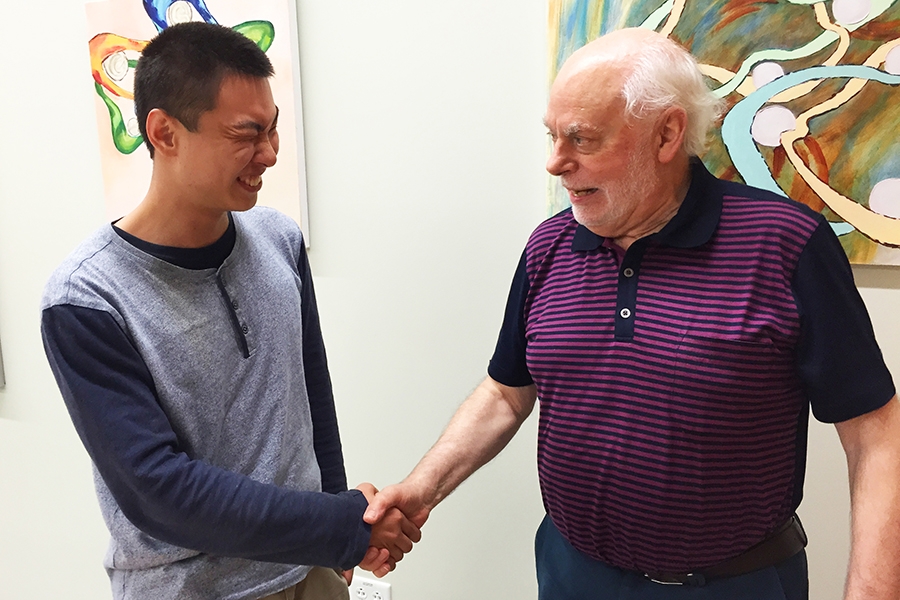
NORMAN, OKLA. – University of Oklahoma assistant professor Yuanning Feng, Ph.D. authored an article published in a special edition of Trends in Chemistry, “From mentee to mentor: advice for new principal investigators.” In the article, Feng describes lessons he has learned as a new mentor in his field and from his time as a mentee while pursuing his doctoral degree and working as a postdoctoral fellow.
The article describes three key pairs of factors that make for a strong relationship between mentors and mentees: kindness and helpfulness, communication and collaboration, and patience and tolerance.
Feng received a doctorate in chemistry from Northwestern University where he studied under the supervision of Sir Fraser Stoddart, Ph.D., who won the Nobel Prize in Chemistry in 2016, among other significant accolades. During his long tenure as a chemist and academic, Stoddart mentored hundreds of students and postdoctoral researchers. From the moment he first met Stoddart, Feng was struck by how gracious Stoddart was, even with students he did not know. Within the Stoddart Group, says Feng, members work ‘with,’ not ‘for’ Stoddart.
At a conference in 2022, the editor of Trends in Chemistry noticed the strength of mentorship between Stoddart and Feng. When she learned Feng had taken on his own leadership role at OU, she asked Feng to author the paper for the “Emerging Leaders in Chemistry” special issue for the 5th anniversary of Trends in Chemistry and the 50th anniversary of publisher Cell Press.
After joining the faculty at OU in August 2023, Feng spent the last year contemplating the mentorship that was modeled to him. “I learned a lot about how to deal with mentorship from Stoddart, and during the past two semesters, I’ve thought about advice I could offer to the other new faculty members.” Currently, Feng supervises one postdoctoral fellow, two graduate research assistants, and over ten undergraduate students, taking the lessons he learned from Stoddart and applying them in his own research group.
“The high esteem that principal investigators are often held in by members of their laboratories or working groups can create a power imbalance that leads to unhealthy mentorship,” said Feng.
For Feng, mentorship is important for all mentees he works with. He prioritizes their involvement in conferences and helps his students prepare for them and teaches them how to present their research. From helping students improve their writing skills through thorough yet constructive feedback to fostering an environment of positivity and patience, Feng’s dedication to the principles outlined in his article helps him nurture the next generation of scientists being educated at OU.

About the publication
“From mentee to mentor: advice for new principal investigators.” is published at https://doi.org/10.1016/j.trechm.2024.04.008
About the University of Oklahoma
Founded in 1890, the University of Oklahoma is a public research university located in Norman, Oklahoma. As the state’s flagship university, OU serves the educational, cultural, economic and health care needs of the state, region and nation. OU was named the state’s highest-ranking university in U.S. News & World Report’s most recent Best Colleges list. For more information about the university, visit ou.edu.
Researchers at the University of Oklahoma have developed new hybrid materials that challenge conventional thinking about how light-emitting compounds work and could advance the field of fast radiation detection.
The University of Oklahoma honored the legacy of the late Berrien Moore III, who served as dean of the College of Atmospheric and Geographic Sciences and director of the National Weather Center from 2010 until his passing in December 2024, with a dedication ceremony for the Oklahoma Weather Lab (OWL) broadcast space at the National Weather Center.
University of Oklahoma alumna Farris Tedder was recently named a 2026 Gates Cambridge Scholar, an international award given each year to scholars from around the world, including just 26 students from the United States, to pursue postgraduate study at the University of Cambridge.